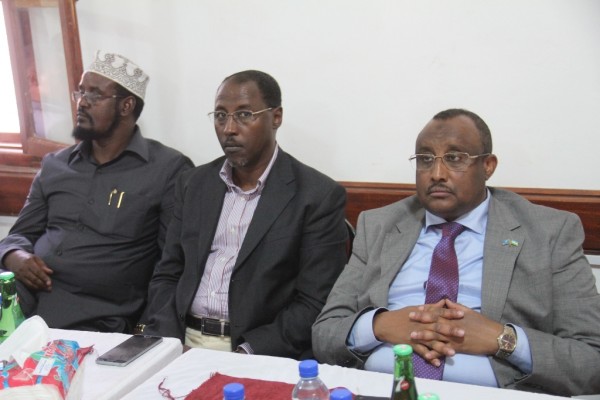State leaders spoil for a fight with parliament over 2016 electoral model proposals

Regional administrations are headed for a clash with the Federal Parliament following what is emerging as the House’s move to clip the powers of the federal state leaders in the forthcoming elections.
Jubbbaland and Puntland issued statements in the past three days castigating what it terms as arbitrary attempts by parliament to mutilate the recommendations of the National Leadership Forum, NLF which were presented to parliament early this month.
The two states, though have not zeroed in the specific concerns, point to the proposal to deny regional presidents the power to nominate the two candidates for the Upper House and subsequently sign off the final list of the chosen candidate.
National Leadership Forum
The NLF, whose make up the regional presidents dominate gave powers to the regional heads in what critics have termed as an affront to democratic principles since the said leaders are interested parties in the process. The civil society has demanded the National Independent Electoral Commission, NIEC, which is the constitutionally mandated organ to oversee the polls be left to undertake the whole process.
Parliament appointed a 26 member technical committee to go through the proposals before submitting it to the House for debate. The committee is made up of serving and former MPs.
In a statement Sunday, Jubbaland took issue with the composition of the committee noting the presence of serving legislators will compromise the process since they have vested interests. It further accused the committee of seeking to whittle down some of the proposals as agreed by NLF.
“Already sources close to the committee have reported a drop in the points in the proposal that were jointly agreed from the four deliberative days in the NLF. Sources have also indicated a scheme for an extension of both the term of the legislature and the government beyond its constitutional mandate and alteration to the structure and mandate of the Upper House and the Electoral College,” said Jubbaland government Sunday.
Delegates
It emerged this week that the 26 member committee was working on cutting down the number of delegates who will elect each lawmaker from 50 to 31. NLF had proposed that each Lower House MP be elected by 50 delegates.
The choice of 50 delegates, which brings to a total of 13,750 the number of voters for the 275 member Lower House was based on the call for enhanced legitimacy as espoused by the guiding principles published by the National Consultative Forum late last year.
But sources privy to the on goings note parliament is not happy with the number because it sets the stakes high for MPs to manipulate the vote. “Bribing 50 delegates is a tall order for parliamentarians so they must find a way to reduce that number to a manageable level,” said a source close to the proceedings who to refused to be named.
Agreed process
Puntland this week also fired another salvo at parliament accusing it of meddling on an already agreed process by the NLF. The state said it acceded to the 4.5 clan based electoral model for the Lower House based on compromise and that the international community would supervise the process but ‘parliament is now interfering with the process to cause chaos and seek an extension’.
The term of the current parliament is set to expire on August 19 this year to pave way for polls but a significant amount of work needs to be disposed of before then. Based on the NLF proposals, Federal and State Level electoral teams are supposed to be formed in time to oversee the Upper House elections in July and Lower House in August.
Extension
Impeccable sources have however told Goobjoog News the government is seriously wooing parliament to suspend article 67 of the Provisional Constitution which stipulates the term of parliament ends after every four years.
“Though the international community looks keen on not entertaining an extension, they have given indications to the government they won’t mind a two months extension. This is also based on a pragmatic view of the pending issues to be addressed which cannot practically be achieved within two months,” a senior government official told Goobjoog News.
An extension, the source said would ensure a new parliament is in place on or before October 19 and the presidential election be conducted either late November or early December.